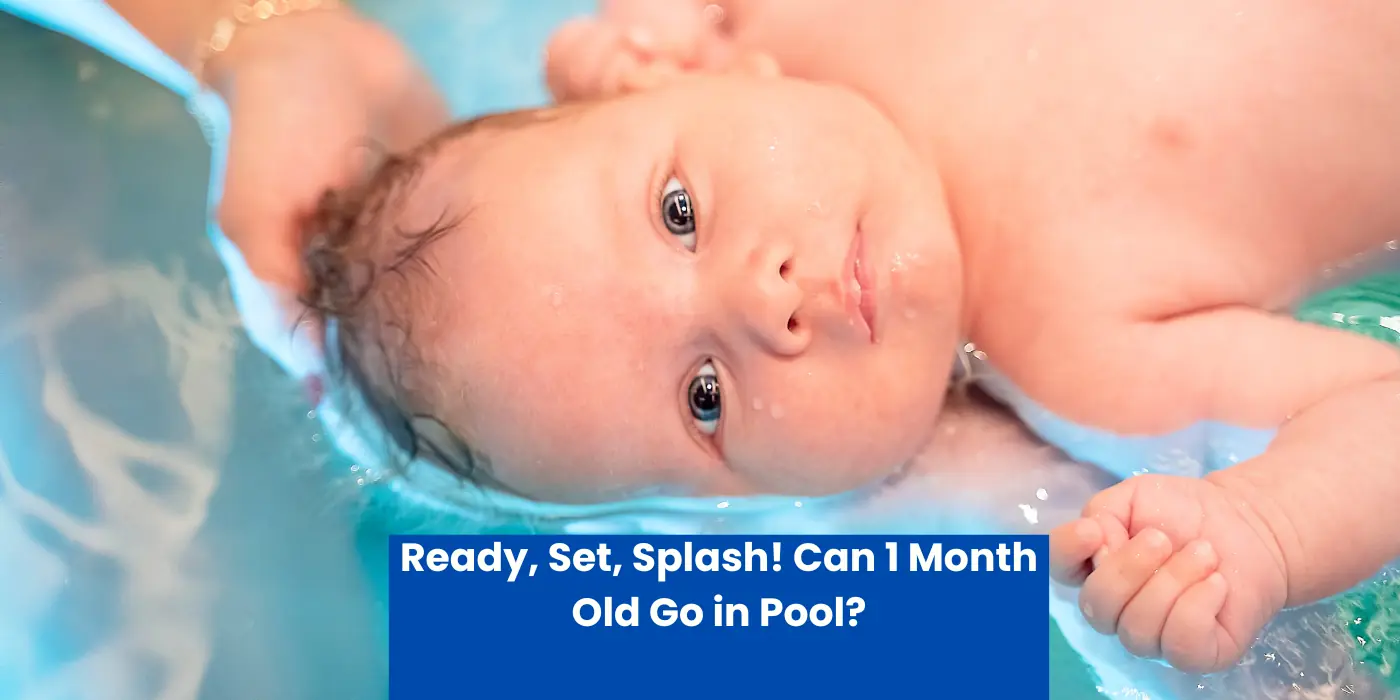As a newborn parent, you will have mastered lots of skills and might be beginning to gain some confidence in caring for your little one. There’s one query that pops up time and time again though- can 1 month old go in pool?
It’s a question that many parents have, especially as the summer months approach. With so much information out there, it can be difficult to know what is safe and what isn’t when it comes to swimming with your baby.
So if you’re wondering if 1 month old babies go in pool – and if not, when- read on!
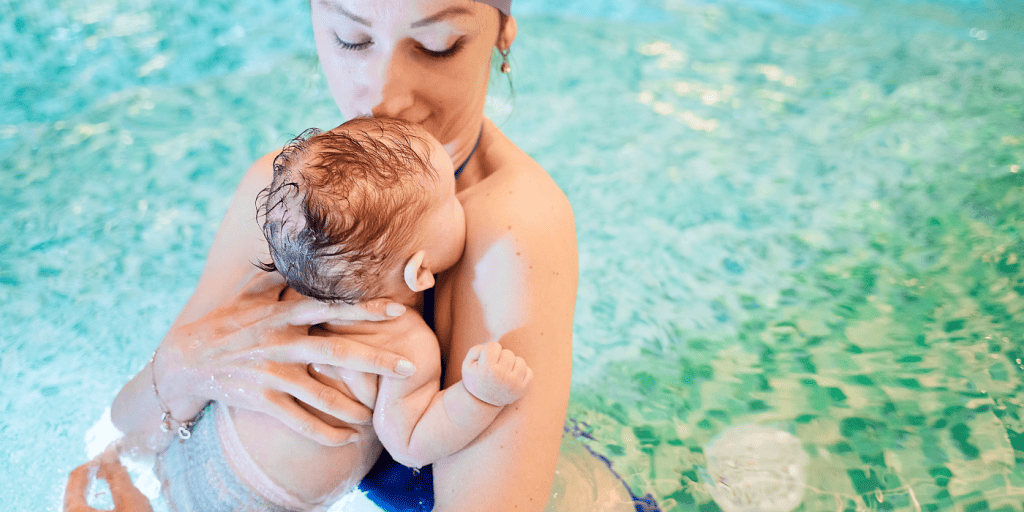
Benefits of Swimming for Babies
Swimming is a great way to help babies develop physically, cognitively, and socially. It can be a fun activity for both parents and their little ones that also offers many benefits.
Here are some of the ways swimming can benefit your baby:
Physical Development:
Swimming helps babies strengthen their muscles and build coordination. As they move through the water, they learn how to control their body movements in different directions.
This helps them become more aware of their physical abilities as well as helping with balance and coordination when walking or running later on in life.
Additionally, it’s an excellent form of exercise that doesn’t put too much strain on developing bones or joints.
Cognitive Development:
Swimming encourages problem-solving skills by teaching babies how to navigate through the water using various techniques such as kicking or paddling with arms and legs together.
It also requires concentration which can help improve focus while stimulating mental development at the same time!
Spending quality time in the pool with your baby provides plenty of opportunities for bonding while learning new skills together.
Babies become accustomed to being around other people during swim classes, which helps them become more comfortable socializing outside of home environments over time; this makes it easier for them to make friends later on in life.
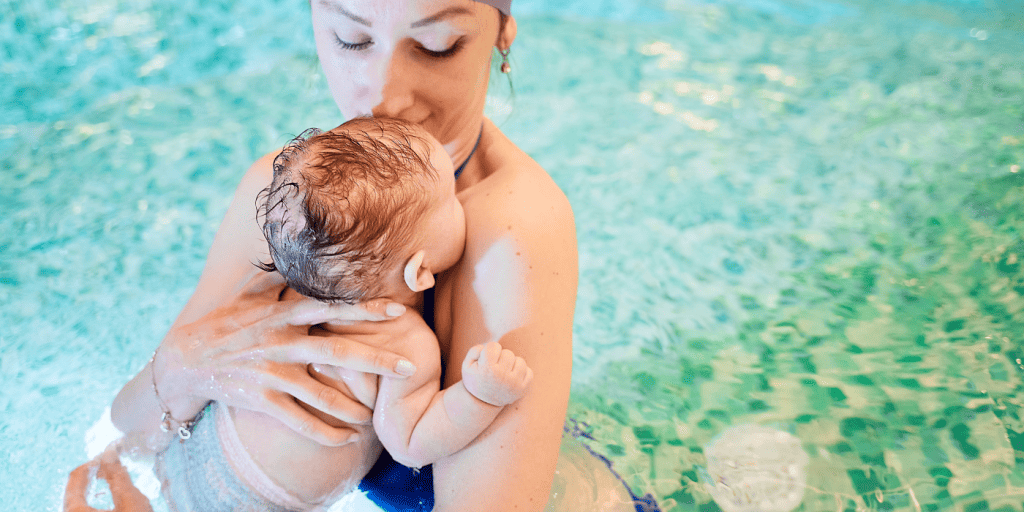
When Can Babies Start Swimming?
But when can babies start swimming?
It’s important to know the age guidelines, health considerations, and safety tips before taking your little one into the pool.
Age Guidelines for baby swimming:
Most experts recommend waiting until at least 4 months of age before introducing your baby to water activities.
This is because their immune systems are still developing and they may be more susceptible to infections from bacteria in pools or other bodies of water. Additionally, babies lose body heat fairly quickly.
If you decide to take them earlier than this, make sure that you consult with your pediatrician first for advice on how best to keep them safe while swimming.
Health Considerations:
Babies under 6 months old should not be allowed in chlorinated pools as it can irritate their skin and eyes. You should also avoid taking them into hot tubs or jacuzzis as these are too hot for their delicate skin.
Additionally, if your baby has any medical conditions such as asthma or allergies then it’s best to check with your doctor before allowing them in the pool as certain chemicals used in some pools could aggravate these conditions further.
When introducing babies younger than 12 months old into a pool environment, there are several safety precautions that need to be taken.
An adult who knows CPR should always be present. The depth of the pool should be appropriate for their age and deep end diving boards should be avoided.
Proper flotation devices should also be used and play areas kept away from drains. Children must never be left unattended near water, even if they know how to swim; basic water safety rules such as no running around the edge of a pool should also be taught.
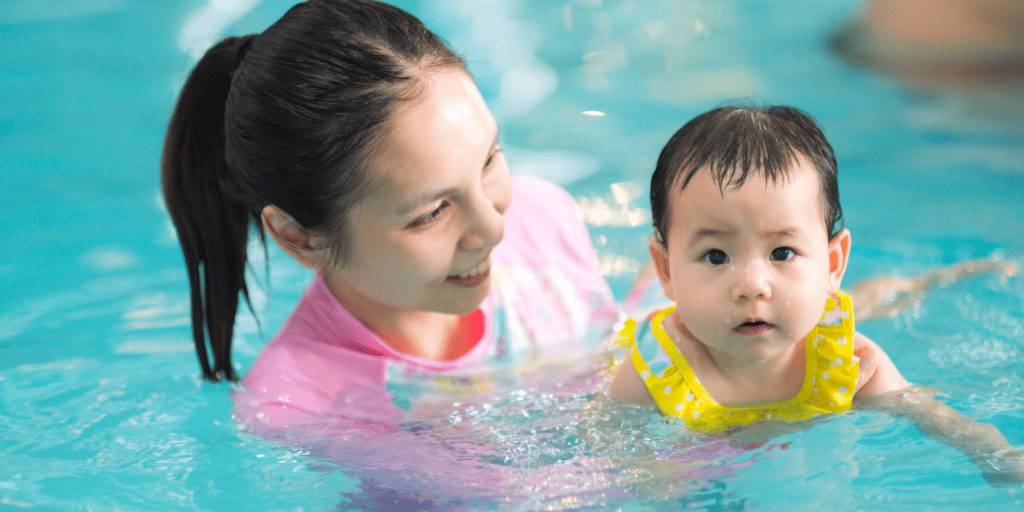
Preparing for Baby’s First Swim
Preparing for Baby’s First Swim can be an exciting yet nerve-wracking experience. It is important to make sure you are well prepared and have all the necessary items on hand before your baby takes their first dip in the pool. Some of these are similar to the things you had to consider when managing baby’s first bath
Pool Temperature and Depth:
The temperature of a swimming pool should be between 78°F – 82°F, as this is comfortable for babies.
You will also want to check the depth of the pool, making sure it is shallow enough for your baby to stand up in or float around safely without any assistance from you.
Clothing and Accessories to Bring Along:
When preparing for your baby’s first swim session, it is important that they wear appropriate clothing such as a swimsuit with built-in sun protection or a wetsuit if needed. If you are bringing water wings, an infant life jacker or personal floatation device, ensure that it is approved by the United States Coast Guard.
Additionally, you may want to bring along some extra items like water shoes, goggles, hats and sunscreen so that your little one stays safe while having fun!
When choosing an instructor or class for your baby’s first swim session, it is important to look for experienced instructors who specialize in teaching young babies how to swim.
Make sure they are knowledgeable about safety guidelines and can provide personalized instruction based on each child’s individual needs.
Ask questions about their qualifications before signing up so that you can be confident that your baby will receive quality instruction during their time in the pool.
What to Expect During Baby’s First Swim Session?
Getting Used to the Water Environment and Temperature Changes:
During your baby’s first swim session, it is important to make sure that they are comfortable with their surroundings. Start by introducing them to the pool environment slowly.
Have them get used to the temperature of the water and let them splash around in shallow areas. You can also use toys or games such as floating rings or rubber ducks to help keep your baby entertained while they adjust.
Introducing Basic Swimming Techniques and Skills in a Fun Way!:
Once your baby is more comfortable with being in the water, you can start teaching basic swimming techniques like kicking, paddling, and blowing bubbles underwater. Make sure that these activities are fun for both you and your little one!
Use songs or rhymes during lessons so that learning becomes an enjoyable experience for everyone involved. Bonding with your baby through playful interactions in the pool is one of the best parts about taking a swim class together.
Try out different games such as “Follow The Leader”, where you and your child take turns leading each other around obstacles placed at various depths within the pool area.
This will not only help strengthen their swimming skills, but also build trust between parent and child while creating lasting memories together.
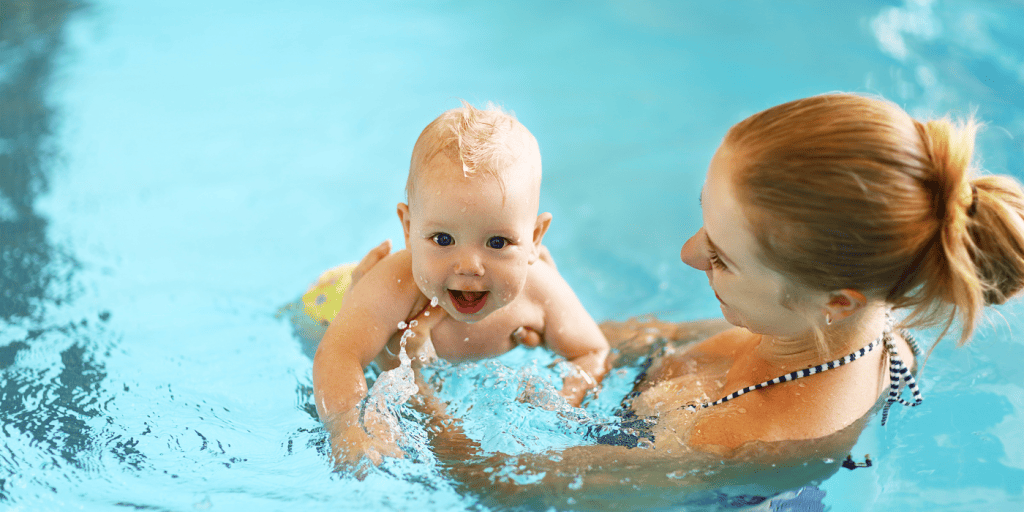
After the Swim: Taking Care of Your Little One! A. Keeping Baby Hydrated and Nourished After Swimming B. Properly Drying Off and Changing Clothes C. Ensuring Proper Rest and Relaxation
After a fun and exciting swim session with your little one, it is important to ensure proper care for their safety and well-being. Keeping baby hydrated and nourished after swimming is essential in order to prevent dehydration or exhaustion.
Offer your baby plenty of fluids such as water or milk before and after the swim session. You can also provide them with light snacks like fruits, crackers, or yogurt that are easy to digest.
Properly drying off and changing clothes should be done immediately after leaving the pool area in order to avoid any chilliness from wet clothing on their skin.
Make sure you have extra sets of dry clothes available so that you can change them quickly when needed.
If possible, bring along a warm towel specifically designed for babies or children from a young age, which will help absorb more moisture than regular towels do. Wrapping baby’s towel in a hot water bottle will pre warm it, helping to keep baby warm.
Ensuring proper rest and relaxation is key for your baby’s health, especially if they had an intense swimming session.
FAQs in Relation to “Can 1 Month Old Go in Pool?”
How soon can a newborn go into a pool?
It is generally recommended that newborns wait until they are at least two months old before entering a pool.
Before this age, their immune systems are still developing and may not be able to handle the chlorine in pools or other chemicals used to keep them clean.
Additionally, babies under two months of age cannot regulate their body temperature as well as older infants, so it is important to ensure the water temperature is comfortable for them when entering a pool.
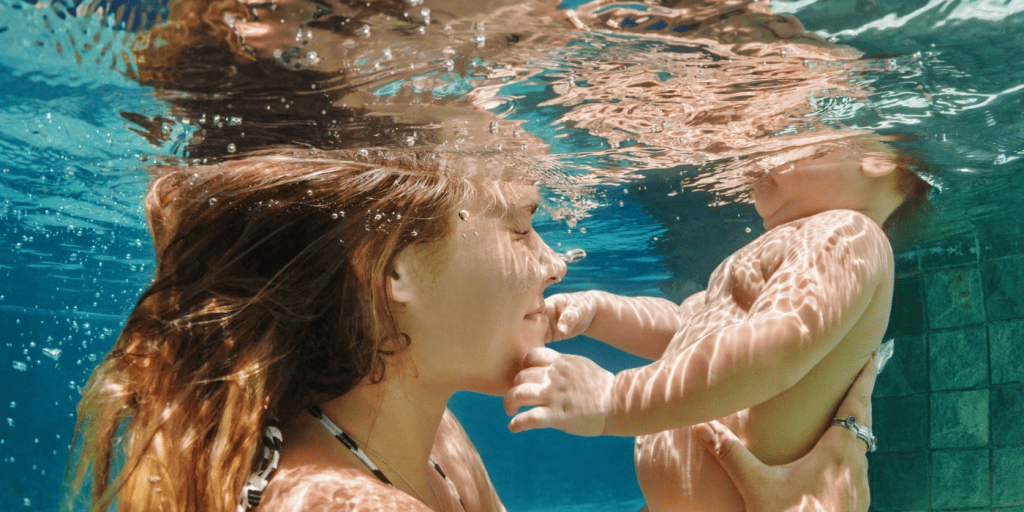
Can a newborn go in a chlorinated pool?
No, a newborn should not go in a chlorinated pool. Chlorine is an irritant and can cause skin irritation or respiratory problems for infants who are too young to regulate their own body temperature.
Additionally, the chlorine levels in pools may be too high for a newborn’s delicate skin and could potentially lead to rashes or other health issues.
It is also important to note that babies under six months of age have not yet developed the ability to swim on their own and could easily become overwhelmed by the water if they were to go in a pool without proper supervision.
For these reasons, it is best to wait until your baby is at least 2, but ideally 6 months old before taking them into any type of chlorinated pool. If you wait for them to get a little older, swimming lessons will be an option. The American Academy of Pediatrics doesn’t recommend baby swim lessons until babies are at least one year old.
Can a 1 month old be in a pool?
It is generally not recommended for a 1 month old to be in swimming pools. At this age, babies are still developing their immune systems and may not have the necessary protection from bacteria or other contaminants that can be found in pools.
Additionally, they lack the coordination and strength to keep themselves afloat, so it would require constant supervision by an adult if they were to enter the water, just like any young child. Furthermore, chlorine levels in pool water can irritate delicate skin and eyes of young infants.
If you have a permanent pool at home, do not become complacent, even if your baby has learned to swim. Never leave your child unattended around the pool, or even outside arm’s reach, and ensure that the pool is securely fenced off, with pool alarms set. The use of a life jacket can also give a false sense of security- nothing replaces full parental supervision.

